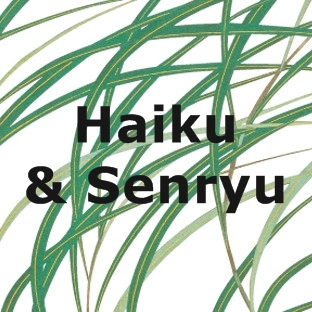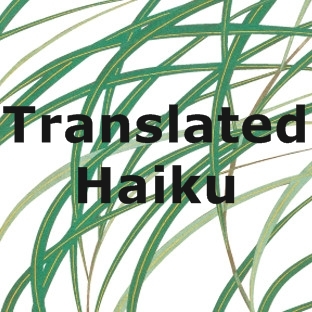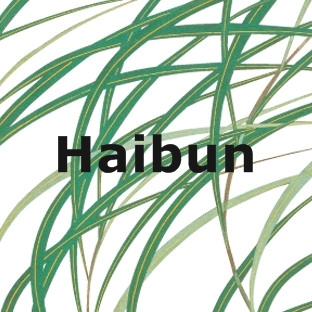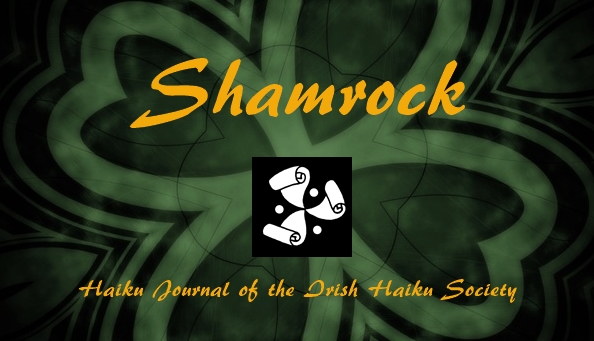the rest of the world
An international online journal that publishes quality haiku, senryu and haibun in English
irishhaikusociety[at]gmail[dot]com
(not for submissions)
Home Page
Archive
Book-Shop

Shamrock Haiku Journal Readers' Choice Awards 2016
BEST HAIKU
Ten haiku have been nominated as the best of the year by our readers and contributors. The following pieces that appeared in our No. 35 was voted the best haiku published in Shamrock Haiku Journal in 2015:
after the fighter
a goldfinch recaptures
the sky
-- Brad
Bennett (USA)
The following haiku were the runners-up (in alphabetical order):
old goat
climbing into a greater
solitude
--
Anatoly Kudryavitsky (Ireland) # 34
that moment between
dead brown leaf
and butterfly
--
Earl Livings (Australia) #35
BEST
SENRYU
Seven senryu have been nominated as the best of the year by our readers and contributors. The following piece that was initially published in our No. 35 became the winner in the best senryu category:
farmers' market
the honey vendor
swats a bee
--
Ann Magyar (USA)
And the runners-up were the following pieces (in alphabetical order):
drought –
the farmer's frown
and that of a pumpkin
--
Adjei Agyei-Baah (Ghana) #35
insomnia –
the skipping stone
skips forever
--
Rajandeep Garg (India) # 34
We congratulate the worthy winners, and express our sincere gratitude to each and every reader who cast a vote.
Irish Haiku Society International Haiku Competition 2016
The prize-winning haiku from this competition are available for viewing here:
https://irishhaiku.com/haikucompetition.htm
There are excellent poems aplenty on that page; check them out!

haloed moon
the tyre-swing hanging
from a gum branch
morning drizzle
a wagtail shimmies
on the gatepost
night rain
thunder rolls from valley
to valley
summer sunset
the palomino mare's hide
of deepening gold
--
Gavin Austin (Australia)
garden visit –
a nose-full
of evening primrose
sunset –
the cow's tail
conducting flies
fire exit –
fourteen steps
gathering leaves
snowdrop huddle –
beads of rain-light
on the weeping birch
--
Hugh O'Donnell (Ireland)
autumn chill
a rustle of leaves
in my chest
winter wind
the steadiness
of electric candles
--
Ben Moeller-Gaa (USA)
eventide
shallow footprints
disappear
a sudden head-thump
lesson from
the metal pole
--
Ayaz Daryl Nielsen (USA)
morning fog
jack-o-lanterns grin
from the compost pile
first snow
the steam
off homemade soup
--
Joshua Gage (USA)
afternoon lull –
a tiny blue butterfly
braids the sky
winter gust –
how a willow bends
the night
--
Theresa Cancro (USA)
beneath the high autumn sky
a field
of solar panels
on the wind
the yellow fragrance
of katsura
--
Beverly Acuff Momoi (USA)
not so cold
when you take my hand
the seaside cave
--
Michael Dylan Welch (USA)
tidal pool currents
the constant sway
of the sea anemone
--
Jay Friedenberg (USA)
hail storm
the incense
of muddled mint
--
Alanna C. Burke (USA)
snow-covered pines
a coydog's breath
fills the darkness
--
Anna Cates (USA)
mosquito netting
the swallows fledge
a second brood
--
Aron Rothstein (USA)
first snow
full moon floating
on a ghost tree
--
Jennifer Hambrick (USA)
midnight moth
the moons of Jupiter
mapped on her wings
--
Stuart Bartow (USA)
Yule tide
the glitter of candlelight
in a child's eye
--
Mike Flanagan (USA)
summer day
on the dead tomato plant
one small red tomato
--
David Oates (USA)
long winter –
the stray dog's shadow
grows thin
--
Bryan Rickert (USA)
rangeland
webs of rain connect
the thistles
--
Debbie Strange (Canada)
nursery school
wheat seeds in cotton wool
starting to sprout
--
Jan Dobb (Australia)
balmy evening
fields of rapeseed
oozing oil
--
Teresa O'Neill (Ireland)
morning train
I invite a little girl
into my colouring book
--
Mercy Ikuri (Kenya)
daytime moon
a beggar's bowl
full of dreams
--
Rajandeep Garg (India)

Ryuta Iida
飯田龍太
(1920-2007)

Ten years ago the haiku world lost one of its best poets, Ryuta Iida. Born in the Yamanashi Prefecture, he was the fourth son of the well-known haiku poet Iida Dakotsu who was, in his turn, a son and a grandson of prominent writers of haiku. Ryuta Iida’s brothers died in their childhood. He graduated from university in 1947, having conducted research into the works of Matsuo Basho. Since 1951 he worked at the library of Yamanashi prefecture in Kofu city and took an active part in the so-called Modern Haiku Movement. In 1954 he published his first collection of haiku and went on to publish many more. His father Dakotsu died in 1962, and Ryuta Iida, in his turn, became one of the best-known Japanese haijin. He edited the notable haiku magazine, Unmo. He will be sorely missed by all the lovers of haiku but his legacy – and his poems - will live.
凧ひとつ浮かぶ小さな村の上
flying over
the small village,
a solitary kite
冬耕の父母見下ろしに子が帰る
a child returns
to watch his parents
winter ploughing
母いまは睡りて花の十姉妹
mothering …
Bengalese finch
and a sleeping flower
葱抜くや春の不思議な夢の後
after the spring
of strange dreams
all the green onions pulled
白梅のあと紅梅の深空あり
after viewing
white plum blossoms
the sky the colour of red ones
涼風の一塊として男来る
man enters the house –
a build-up
of cool breeze
春風の朝隅々に主婦の智慧
in the morning, spring breeze
in each corner of the house –
housewife's wisdom
闇よりも山大いなる晩夏かな
no darkness as dark
as the Kana mountain's shadow
in late summer
雀歩くたのしさ霜のトタン屋根
hoarfrost –
a sparrow takes a fun walk
on the corrugated iron roof
夕焼けて護国神社の裏しづか
at sunset
the rear of the Gokoku shrine
so restful
雪の日暮れはいくたびも読む文のごとし
the sun sets into snow –
the letter read
and reread
春分の湯にすぐ沈む白タオル
vernal equinox –
my white towel
sinks into the bathtub
どの家も蚕の香桑の香晴れわたり
under the tranquil sky,
the scent of silkworms and mulberries
from every house
遠方の雲に暑を置き青さんま
sending heat
to distant clouds...
blue saury fish
さびしさは秋の彼岸のみづすまし
loneliness
a pond-skater glides
across autumnal equinox
紅茸のつむり幼き墳墓の地
the infant head
of a red mushroom...
family graveyard
鍬の影鋭くあそぶ土の熱
the shadow of a hoe –
its interplay with
the warm soil
鳥帰るこんにやく村の夕空を
from the gardens
of konnyaku potatoes
birds return to the evening sky
白樺の雨につばめの巣がにほふ
swallow's nest
in the rain-soaked birch –
its soft smell
一月の川 一月の谷の中
river of January
cutting through the valley
of January
星月夜こころ漂ふ藻のごとし
starry moonlit night –
my algae-like
drifting mood
Translated
from the Japanese by Anatoly Kudryavitsky
The translator wishes to gratefully acknowledge the
assistance of the
author and academic Sally Ito of Canada in the preparation of this
haiku selection.

Coffee in
Bucharest
by
Derek Ross (Scotland)
Bucharest in the rain is a study in grey. A low leaden sky presses down
on cracked, graffiti-smeared apartment blocks. The drains cannot deal
with the deluge and the filthy street has become a river. Hunched
figures scurry down the treacherous pavements, scarcely bothering to
avoid the puddles.
Yet here I am, warm and comfortable, sitting in a new Belgian themed
coffee shop. Another example of the contrasts that define Bucharest,
that define Romania.
My "long" espresso arrives, it is perfect. As I sip, my eyes are drawn
to the nearest window. A battered Dacia is struggling to pull out into
the endless stream of traffic. A shiny black Audi patiently waits for
the precious parking place. It is the contrast thing again.
The soup I also ordered arrives, it's cold, of course it is.
sudden shower
the city flowing down
a dirty window
There Once
Was a Time
by
Adelaide B. Shaw (USA)
This is a time of joy, of pleasure in anticipation. The lights and
sparkle, the fragrances and food. The snow and presents. This is a
childhood Christmas.
December is the longest month in my impatient child mind. The days of
Advent. Count them off – one, two, three ... days of diligently working on
the embroidered pillow cases for Aunt Jo, the making of paper chains
and snowflakes, of sponge painting plain tissue to use as gift wrap, of
helping Mom bake cookies and fruitcake.
There are trips into town to view the decorated windows, visits to toy
land and Santa. It doesn't matter that department store Santas are
seldom plump and rolly-polly, but often thin and angular. We know they
are stand-ins for the real Santa who is busy working in the North Pole.
This is a time to accept, to believe and hope, a time to wish, to
ignore the news of the dead and dying, of battles won and lost in
Europe and in the Pacific, a time to not speak of Uncle Jim fighting
somewhere in Italy, a time not to complain about shortages, about Dad
working late, about Mom working the swing shift from four to eleven p.m.
evening prayers
I forget to put myself
at the end

Small Shadows by John Hawkhead A
Haiku and Senryu Collection Alba
Publishing, P.O. Box 266, Uxbridge, UB9
5NX, England, 2016 Available
from www.albapublishing.com Priced
at GBP 12, Euro 14, USD 15.
an old gardener
standing in Autumn wind
one leaf in his hand
which deftly pulls into focus with the lightest of touches the double-edged sword of the diminishing strength and heightened wisdom of the elderly, while encouraging us to question, perhaps, the significance of the one among many. Excellent stuff. That upper case A on autumn is a slight niggle, though is a fleeting blip in a book otherwise pleasingly designed and typeset for maximum visual appeal. That bird's skull, for instance, is an arresting white-on-black, while the poems are delivered one per page. There are some interesting 'conversations' set up between work on facing pages, but there is a lack of sequential unity throughout, beginning and ending with old age, but with some jarring shifts of focus in between – more thought here might have added a greater sense of cohesion to the book as a whole.
Small Shadows isn't all about decline. There are, in particular, some exquisitely sensual moments – the crossing of thighs, 'the curve of her spine' – but there's the feeling that all is seen with an awareness of the abutment of life and death. This comes no closer than in
deathshead hawkmoth
in a museum cabinet –
my breath on the glass
Here, we have a good example of Hawkhead's knack of encapsulating a whole scene in a few, brief brushstrokes, not to mention how his final lines have a robust, enduring kick – and how he modifies the form (the collection begins, radically, with a bonsai-shaped poem spiralled over eight lines, and there are some two-liners and other variations). That clever play on his own name, meanwhile, flags up Hawkhead's sharp wit; used playfully against himself, his wry humour delivers a laugh with some of those third-line surprises, as in this senryu:
forty five today
special treat in the bedroom
second cup of tea
That lovely sense of contemporary domesticity reflects a comfortable use of today's linguistic currency – we encounter radiotherapy, Alzheimer's, plastic grass, 'hookers' calling cards' – but we are also anchored in timelessness by the reassuringly enduring moon, clouds, snowflakes, and some exquisitely observed animal kingdom vignettes, including my favourites, caterpillars 'climbing thin air', and gnats 'skywriting ampersands'.
In each of these evocative haiku and senryu, we enter moments of life richly lived and sharply observed. Life does, of course, have its small shadows – shadows that will inevitably grow longer, or into which we might, as 'mother' does in the final poem, 'settle down' and perhaps fail to rise again. But in the meantime, we can relish what we have: here is a lesson in not only making every word count, but also every second. It's not surprising that many of Hawkhead's haiku have won awards: they unfailingly ring true.

